The NHL is in Sweden this week, and fans of the Maple Leafs, Red Wings, Senators, and Wild can't be faulted for fearing they'll arrive home weary. Flying overseas during the season is a fun novelty, but it disrupts a team's rhythm.
The four-game jaunt faintly resembles the NHL's most elaborate Eurotrip. In the spring of 1959, the Bruins and Rangers faced off 23 times in 26 days in 10 European cities. The Original Six rivals experimented with an orange puck as Bobby Hull began his ascent to superstardom.
Chicago loaned Hull to New York for the grueling exhibition series. To conserve energy for sightseeing, he deliberately put in less effort on the ice. Hull coasted to the slot to focus on burying passes, signaling how he'd snipe 913 goals between the NHL and World Hockey Association.
"Boy, it was suddenly a whole new ballgame. I was lasting a lot longer on each shift and the goals started to go in like clockwork," Hull told the Toronto Star late in his career. "I pinpoint that European tour as the turning point in my life as a hockey player."
On this day in 1959, the Bruins and Rangers began a 23-game exhibition tour of Europe, playing games in England, Switzerland, France, Belgium, Germany and Austria #Hockey365 #NHLBruins #NYR pic.twitter.com/PbbrS8nkdC
— Mike Commito (@mikecommito) April 29, 2021
This weekend's finale in Sweden will be the 42nd NHL game played abroad, be it in Europe or Japan, since 1997. Preseason visits to Australia, China, and Puerto Rico have gotten people talking about the league in distant markets.
At the time, one precedent existed for the Bruins-Rangers odyssey. The Canadiens and Red Wings met in nine offseason matchups in England and France in 1938. Games were paused intermittently so that Detroit coach Jack Adams could explain the rules to the crowd. The squads combined to pot 96 goals but threw disappointingly few hits, as an expat in London reported in a letter to the Montreal Gazette:
Neither Canadiens nor Detroit tried too hard and that reflected on their showing as a whole. The English are pretty hard to fool, even about things they know little of. I think the biggest disappointment for the press and public alike was the lack of body-checking … Over here the press has made everybody believe NHL hockey is murderously rough, and there was nothing in the Earls Court show to support that idea.
In 1959, the Habs rejected a Swiss sports goods dealer's invitation to return to Europe for a month. The dealer, retired hockey pro Othmar Delnon, was undeterred. Through a New York intermediary, he convinced brothers from the legendary Patrick family - Muzz, general manager of the Rangers, and Lynn, GM of the Bruins - to barnstorm the continent following the Stanley Cup Final, which neither team reached.
The point of the series was to make money. Players earned $1,000 and a Swiss winemaker covered their expenses. Bruins forward Johnny Bucyk and head coach Milt Schmidt were among the Hall of Famers showcased to fans in six countries. Notable Rangers included goalie Gump Worsley, a future Vezina Trophy winner, and rugged defenseman Lou Fontinato, whose nose was broken that season in an epic fight with Gordie Howe.
Forbidden by NHL rules from traveling together, the teams flew to London separately to open the series. They traded close wins before Bucyk's hat trick in the fourth game fueled Boston's emphatic 12-4 triumph in Geneva.
"For the losers," United Press International reported, "the best performances were turned in by three members of the Chicago Black Hawks: Pierre Pilote, Eric Nesterenko, and Bobby Hull."
The Rangers recruited those ringers, plus Chicago captain Ed Litzenberger, to fill holes in the lineup. Hall of Fame forward Andy Bathgate, winner of the Hart Trophy in 1959, skipped the trip because his wife had just given birth. Howe agreed to replace Bathgate if the Red Wings granted permission, but he ultimately bailed because of a rib injury.
That allowed Hull, an 18-goal scorer that season at 20 years old, to tag along and dominate. Europe is where his confidence soared. Hull netted or set up dozens of goals alongside Litzenberger, an adept passer and finisher, and Rangers agitator Eddie Shack, the line's puck retriever.
Hull also saw the sights, climbing the Eiffel Tower on foot one afternoon in Paris.
"I didn't have too much in the way of legs that night," he told the Star. "I guess I only got two or three goals."
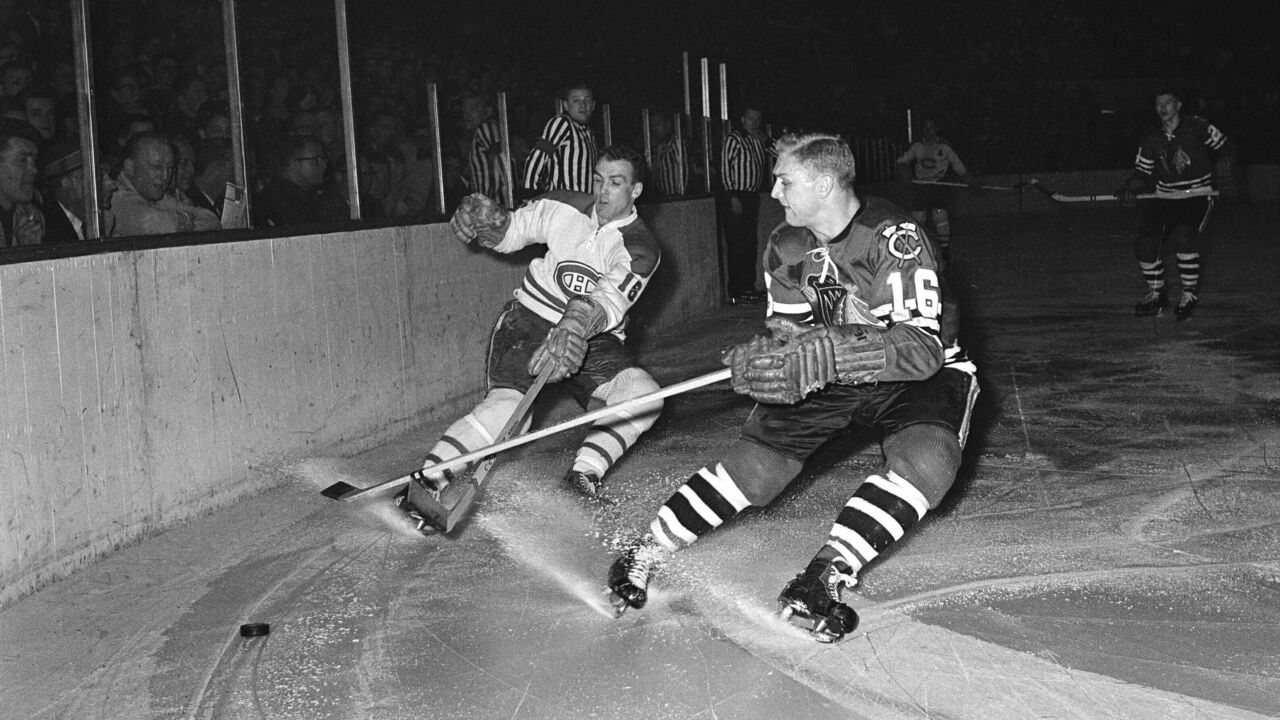
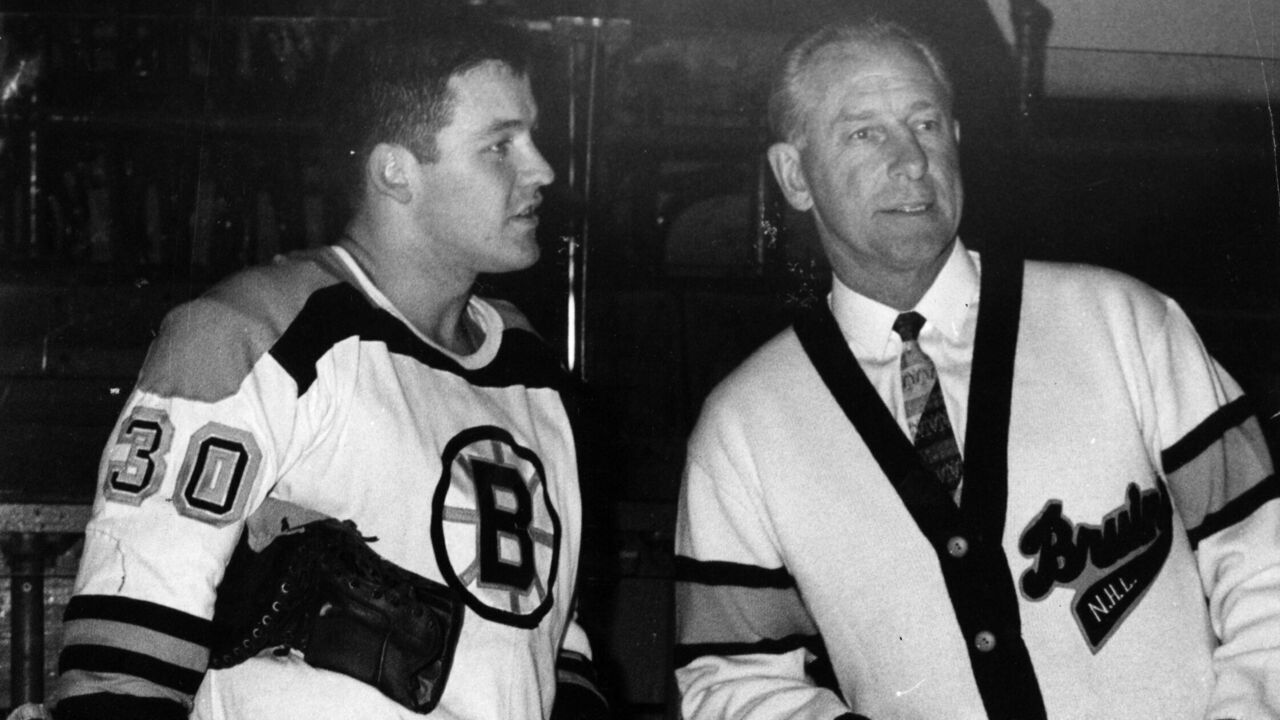
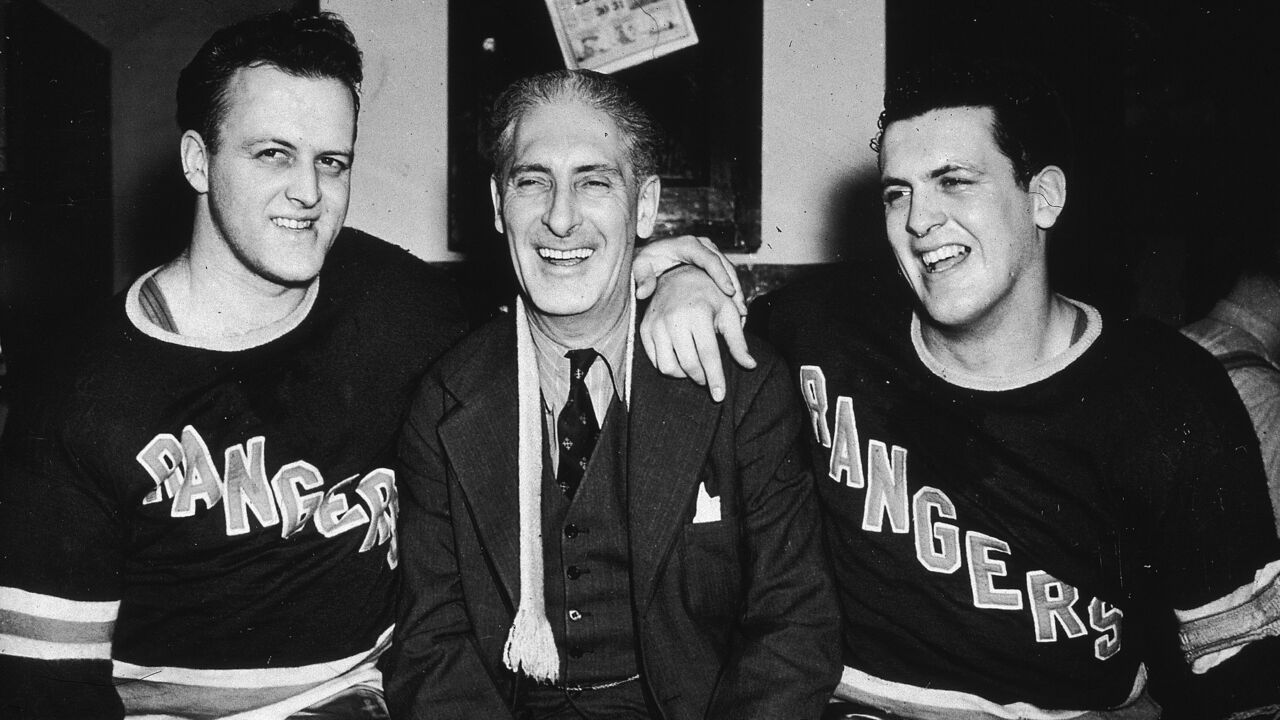
The competitive series - New York went 11-9-3 and outscored Boston 104-101 - was violent at the outset. Bruins center Bronco Horvath threatened to fly home in the first week, citing fatigue from the season and annoyance at the Rangers' headhunting. Bruins captain Fernie Flaman sat down with Rangers counterpart Red Sullivan to defuse the tension, Horvath said in NHL.com's 2009 retrospective of the trip.
The relentless schedule took a toll. Off days - there were three in total - were dedicated to traveling long distances. Certain performances were lethargic, and others drew small crowds. Ticket prices, unfamiliarity with the sport, and the warm spring weather were blamed for poor turnouts of 700 people in Paris and 500 apiece in Antwerp and West Berlin.
"Maybe They Don't Like Hockey," surmised an Edmonton Journal headline following the games in Belgium.
"The hockey tour has been laying an egg of monstrous proportions," famed sportswriter Red Fisher opined in the Montreal Star. "The Rangers and Bruins are strangers to Europeans, and with nobody to root for, apathy sets in."
Other observers came away impressed. Geneva's arena welcomed 18,000 spectators over two nights. Foreign reporters praised the precise passes, slick stickhandling, and timely defensive interventions the NHLers exhibited. France's L'Equipe newspaper remarked, "It's been a long time since we saw such virtuosos on ice."
"The Russians would be chased out of the rink by these ice hockey players," Austrian journalist Walter Schwarz wrote in a dispatch for the Associated Press. "As concerns speed, lightning-fast reaction, body control, and sheer physical power, the North American professionals have no equals."
Multiple winning streaks - first in Games 8-10 in Antwerp and Zurich, then in Games 15-17 in Essen and Krefeld - enlarged New York's series lead. In the clincher, Hull scored in the opening minute of the first and second periods as the Rangers won 3-2 in Berlin. Shack tallied twice in the spirited 4-4 tie at Vienna that closed the tour.
"Several players received major penalties for fighting in Sunday's rough match," the AP reported, "but all was serene afterward as Red Sullivan of the Rangers received a big cup for his team's series victory."
The scene was significant for a few reasons. Czechoslovak players crossed the Iron Curtain to watch the finale in Vienna, foreshadowing that the NHL would internationalize late in the Cold War.
The series was a graceful sendoff for Hall of Fame official Red Storey, who refereed all 23 games. Storey resigned from the NHL weeks before the Eurotrip, stung when league president Clarence Campbell slammed him in the press for missing calls during the playoffs.
"Can't understand the fans over here," Storey wrote in a postcard from Paris to the Toronto Star. "They even appreciate the officials."
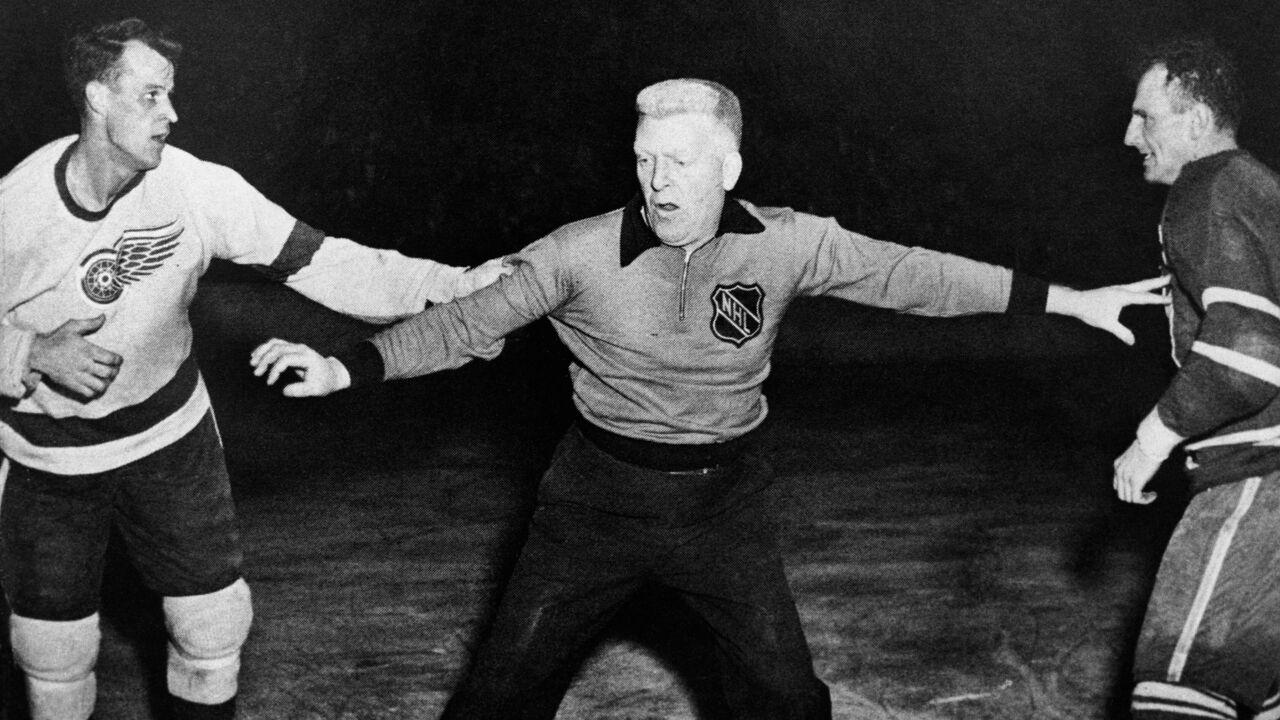
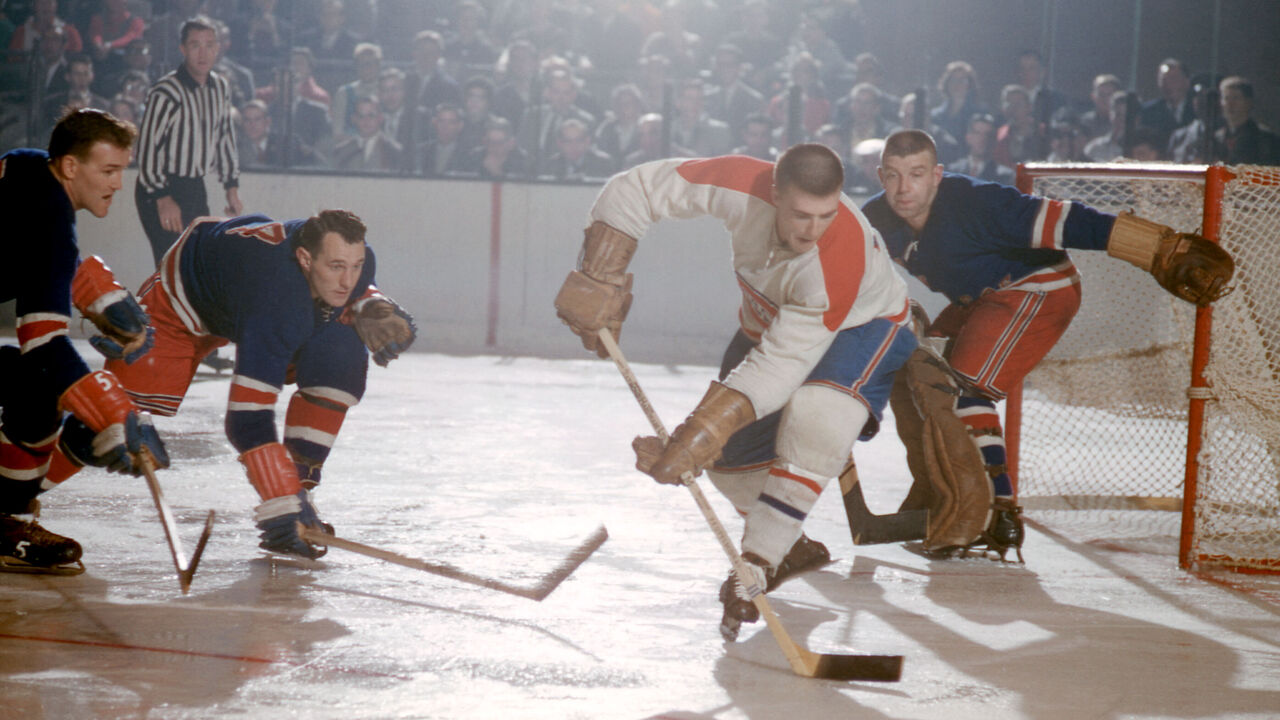
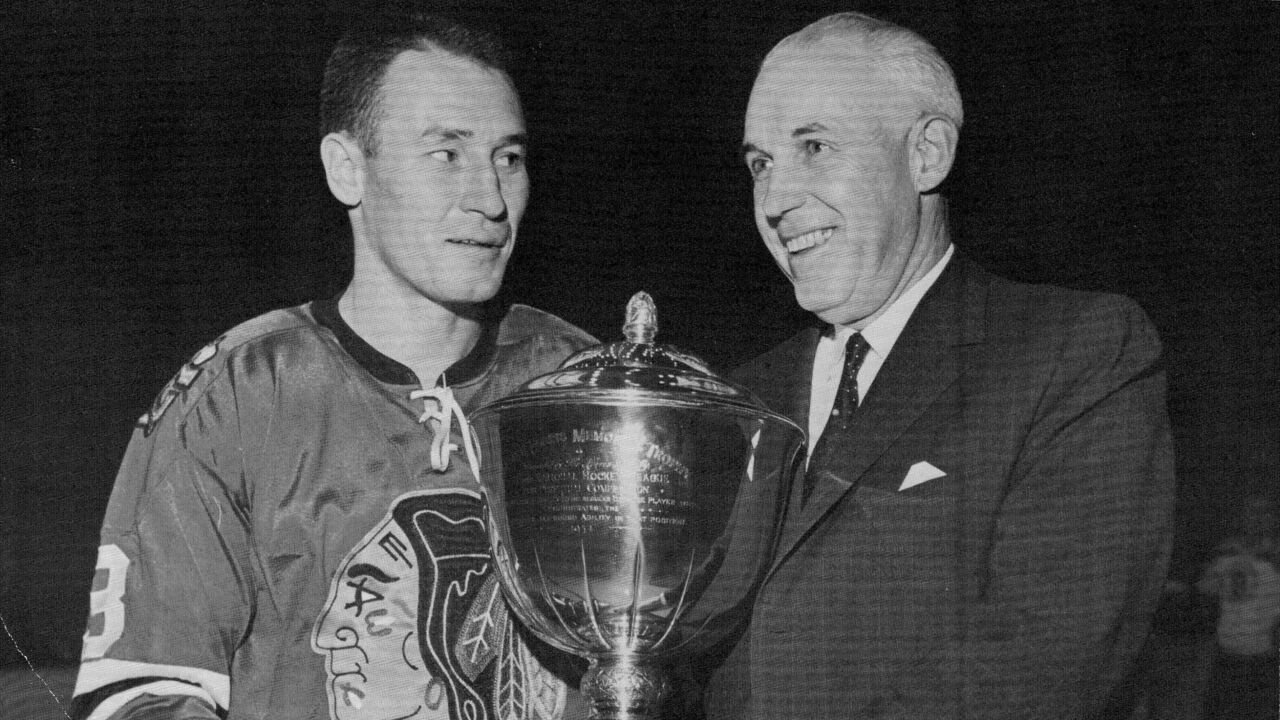
The trip deterred Campbell from making a radical rule change. The Bruins and Rangers packed 288 pucks that had a bright orange side, agreeing to test the designer's hunch that they'd be easier for fans and goalies to track.
"We paid all that excess weight charges on those dizzy things and they were a pure flop," Muzz Patrick told reporters after the series, per the Detroit Free Press. "The players said they couldn't see the puck and wouldn't use them after the first try. They would be good only on black ice. European teams are going to use them, however, because we gave them away free."
The Black Hawks ringers sparkled when NHL play resumed. Hull edged Horvath by a point to win the 1960 scoring title. He teamed with Pilote - a budding three-time Norris Trophy winner - and Stan Mikita to lead Chicago to the Stanley Cup in 1961. Litzenberger and Nesterenko also helped deliver the franchise's only championship of the Original Six era.
In retirement, players retained fond memories of European restaurants. They ate palm-sized steaks at an upscale London hotel, Pilote marveled in his 2013 autobiography. Waiters laughed at Rangers coach Phil Watson, a Montreal native, when he bungled Parisian pronunciations of French words while trying to get a beer, Schmidt recalled in the NHL.com retrospective.
The only gripes about the Eurotrip were minor, Sullivan told the Canadian Press when the journey ended. Some players got stomach aches from overindulging at meals. Rushing to the next game minimized their time in each country.
"But what we saw was pleasant. Girls are pretty and have good figures, the food was good, and the crowds were friendly," Sullivan said. "They have one thing in common: They like to see something for their money. And believe me, our games were no picnic."
Nick Faris is a features writer at theScore.
Copyright © 2023 Score Media Ventures Inc. All rights reserved. Certain content reproduced under license.